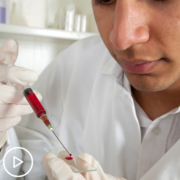Why Should Bladder Cancer Patients See a Specialist?
Why Should Bladder Cancer Patients See a Specialist? from Patient Empowerment Network on Vimeo.
Dr. Fern Anari from Fox Chase Cancer Center reviews the benefits of seeing a specialist for a consultation following a bladder cancer diagnosis.
Dr. Fern M. Anari is a genitourinary medical oncologist and assistant professor in the Department of Hematology/Oncology at Fox Chase Cancer Center. Learn more about Dr. Anari, here.
See More From The Pro-Active Bladder Cancer Patient Toolkit
Related Programs:

|

|

|
Transcript:
Katherine Banwell:
Why should patients consider seeing a bladder cancer specialist? And how can they find a specialist?
Dr. Anari:
So, I think, always, you can speak with your primary care doctor or your local urologist. They’ll know the bladder cancer specialist in the area. I think it’s important to see a bladder cancer specialist, because the field of oncology is always changing. So, you want to be treated by someone who really is the most up to date on treating bladder cancer.
Bladder cancer specialists may also have access to cutting-edge clinical trials, which you may be interested in. So, it’s nice to know what both the standard options are but also the clinical trial options to see what the best fit is for you.
Katherine Banwell:
What advice do you have for patients that may feel like they are hurting their doctor’s feelings by seeking a second opinion?
Dr. Anari:
So, if my patient is interested in getting a second opinion, I always encourage it. And I actually give them recommendations on people to see. I think very few providers will feel offended or upset by one of their patients requesting a second opinion. At the end of the day, each person’s cancer journey is different. And each person needs to feel comfortable with their own treatment plan.
And by getting a second opinion, they may have treatment options available to them that weren’t otherwise available. So, it’s always nice to know what’s out there.





















